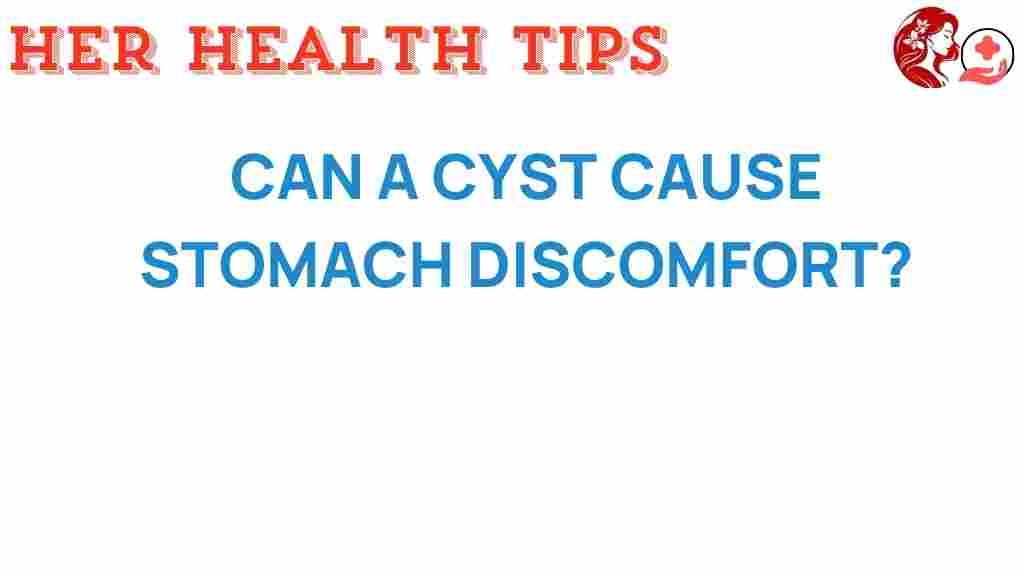Unraveling the Mystery: Can a Cyst Cause Stomach Discomfort?
Many individuals experience stomach discomfort at some point in their lives, often attributing it to common digestive issues or dietary choices. However, when abdominal pain persists or worsens, it raises questions about underlying health concerns. One potential culprit that often goes unnoticed is a cyst. This article aims to delve into the relationship between cysts and stomach discomfort, exploring symptoms, diagnosis, treatment options, and when to seek medical advice.
Understanding Cysts
A cyst is a closed sac-like structure filled with fluid, air, or other material. Cysts can develop in various areas of the body, including the abdominal cavity. While many cysts are benign and asymptomatic, some can lead to significant health issues, including stomach discomfort.
- Types of Cysts:
- Ovarian cysts
- Kidney cysts
- Pancreatic cysts
- Dermoid cysts
- Causes:
- Genetic factors
- Infections
- Obstructions in ducts
- Inflammation
Symptoms of Cysts in the Abdominal Area
While many cysts do not cause symptoms, when they do, the signs can be quite varied. Common symptoms associated with abdominal cysts include:
- Abdominal pain: This can range from mild discomfort to severe pain, depending on the size and location of the cyst.
- Swelling or bloating: A noticeable swelling may occur in the abdomen.
- Nausea or vomiting: This can occur if the cyst causes pressure on surrounding organs.
- Changes in bowel habits: Cysts can impact digestion and lead to constipation or diarrhea.
- Urinary issues: In the case of ovarian or kidney cysts, there may be frequent urination or difficulty urinating.
How Cysts Can Cause Stomach Discomfort
Cysts can lead to abdominal pain and other symptoms through several mechanisms:
- Pressure on Nearby Organs: Larger cysts can press against adjacent organs, causing discomfort and altering normal function.
- Rupture: If a cyst ruptures, it can lead to acute pain and internal bleeding, necessitating immediate medical attention.
- Inflammation: Cysts can become inflamed or infected, leading to significant stomach discomfort and systemic symptoms like fever.
Health Concerns Related to Cysts
While many cysts are harmless, some can lead to serious health issues, particularly if they cause persistent abdominal pain. Potential health concerns include:
- Ovarian torsion: In women, an ovarian cyst may cause the ovary to twist, leading to severe pain and possibly necessitating surgical intervention.
- Infection: Infected cysts can lead to abscess formation and systemic infection.
- Malignant transformation: Rarely, certain types of cysts can develop into cancerous tumors.
Diagnosis of Cysts
If you are experiencing persistent stomach discomfort, it is essential to seek medical advice for proper diagnosis. The diagnostic process typically involves:
- Medical History Review: Your doctor will ask about your symptoms, medical history, and any family history of cysts or other related conditions.
- Physical Examination: A thorough physical exam may reveal tenderness or swelling in the abdominal area.
- Imaging Tests:
- Ultrasound: A non-invasive imaging test that helps visualize cysts.
- CT Scan: Provides detailed images and helps assess the size and nature of the cyst.
- MRI: Used in some cases to obtain detailed images of soft tissues.
- Blood Tests: To check for signs of infection or other abnormalities.
Treatment Options for Cysts
Treatment for abdominal cysts depends on various factors, including the type of cyst, its size, symptoms, and whether it poses any health risks. Common treatment options include:
- Observation: Many cysts do not require treatment and can be monitored over time.
- Medications: Pain management and antibiotics may be prescribed if there is inflammation or infection.
- Drainage: If a cyst is large or symptomatic, a healthcare provider may recommend draining the cyst.
- Surgery: In cases where a cyst is causing significant symptoms or is suspected to be malignant, surgical removal may be necessary.
When to Seek Medical Advice
It’s crucial to understand when to consult a healthcare professional regarding stomach discomfort. Consider seeking medical advice if you experience:
- Severe or persistent abdominal pain
- Sudden onset of sharp pain
- Signs of infection, such as fever and chills
- Changes in bowel or urinary habits
- Unexplained weight loss
Wellness Tips for Managing Stomach Discomfort
In addition to seeking medical intervention, there are wellness strategies that can help manage stomach discomfort associated with cysts:
- Dietary Adjustments: Eating a balanced diet rich in fiber can aid digestion and reduce bloating.
- Hydration: Staying well-hydrated can help alleviate some gastrointestinal symptoms.
- Stress Management: Techniques such as yoga or meditation can be beneficial in managing pain and promoting overall wellness.
- Regular Check-ups: Routine medical check-ups can help monitor any cysts and catch potential complications early.
Troubleshooting Tips for Stomach Discomfort
If you’re dealing with stomach discomfort, here are some troubleshooting tips to consider:
- Keep a Symptom Diary: Track your symptoms, dietary habits, and any triggers that may exacerbate your discomfort.
- Evaluate Lifestyle Factors: Assess factors such as stress, sleep, and physical activity levels that may contribute to your symptoms.
- Consult with a Nutritionist: A professional can provide tailored dietary advice to help manage symptoms.
- Explore Alternative Therapies: Consider acupuncture or chiropractic care as complementary therapies for abdominal pain relief.
Conclusion
Understanding the potential link between a cyst and stomach discomfort is essential for effective diagnosis and treatment. While many cysts are benign, they can cause abdominal pain and other symptoms that warrant medical attention. If you experience persistent discomfort, don’t hesitate to seek medical advice. By being informed about symptoms, treatment options, and wellness strategies, you can take proactive steps toward managing your health effectively.
For more information on health concerns related to cysts, visit this resource. And if you’re looking for additional wellness tips, check out our wellness guide.
This article is in the category Conditions and created by HerHealthTips Team
